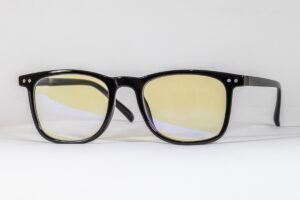Blue light glasses are an increasingly popular form of eyewear that are meant to block blue light coming from screens on electronic devices. Eyeglass companies that produce blue light glasses say that blocking blue light helps prevent eye strain and other harm to your eyes when using electronic devices. However, many people wonder if blue light glasses actually work and if they’re necessary to protect your eye health.
Read on to understand how blue light glasses work, how blue light affects your eyes, and whether you should buy blue light glasses.
Do Blue Light Glasses Prevent Eye Strain?
Many blue light glasses sellers claim that blue light glasses help prevent eye strain when using electronic devices, but there is no evidence that blue light causes eye strain.
You may have heard that blue light is harmful to the eyes because it is closest to invisible ultraviolet light (UV) light on the color spectrum. UV light can burn your eyes and your skin, which is why it’s essential to wear sunglasses and sunscreen. However, the small amount of blue light emitted by electronic devices is different from UV light.
According to the American Academy of Ophthalmology, blue light from device screens has never been proven to cause harm to the eyes.
Because blue light has not been shown to cause eye strain, blue light glasses do not prevent eye strain.
Eye strain is actually caused by blinking less frequently when looking at screens. On average, we blink about 15 times per minute. When we blink less than that, our eyes can become strained more easily. Blinking lubricates the eyes and protects them from dust, light, and other irritants.
Symptoms of eye strain can include dry eyes, watery or tearing eyes, headache, and blurred vision. To reduce digital eye strain, you should take a break every 20 minutes and look at an object at least 20 feet away for at least 20 seconds.
What Do Blue Light Glasses Do? 
Blue light glasses either reflect blue light or absorb it. Lenses with blue-light-reflective coating can appear bluish, while blue-light-absorbing glasses have a yellow or amber tint.
Reflective lenses can only block around 10% of blue light, whereas blue-light-absorbing lenses block at least 35% of blue light. The more blue light a lens blocks, the more orange it appears.
Some lenses block up to 98% of blue light, but they will make everything in your field of vision appear reddish-brown.
Blue light glasses may also help reduce glare from your computer screen.
Should I Buy Blue Light Glasses?
There are generally two reasons why you might want to buy blue light glasses. One is that they can help decrease glare on screens, and the second is that they may boost your sleep health.
If you look at screens near bedtime, the blue light can suppress melatonin production, making it more difficult to fall asleep and disrupting your circadian rhythm. Blue-light-blocking lenses can help keep your biological clock on track, which can be helpful if you use devices before bed.
You may have also heard that you should wear blue light glasses after getting a procedure like LASIK. Again, blue light glasses do not improve eye health or prevent eye disease, but if they make looking at digital screens more comfortable for you in any way, there’s no reason not to wear them.
If you’re experiencing persistent discomfort while looking at screens or any other unusual symptoms, you should visit an eye doctor for an exam.
The specialists at Northeast Ohio Eye Surgeons (NEOES) are highly experienced in treating a wide variety of vision concerns, including dry eye, cataracts, glaucoma, and more.
If you have any questions or need an exam, request your appointment today.















Recent Comments